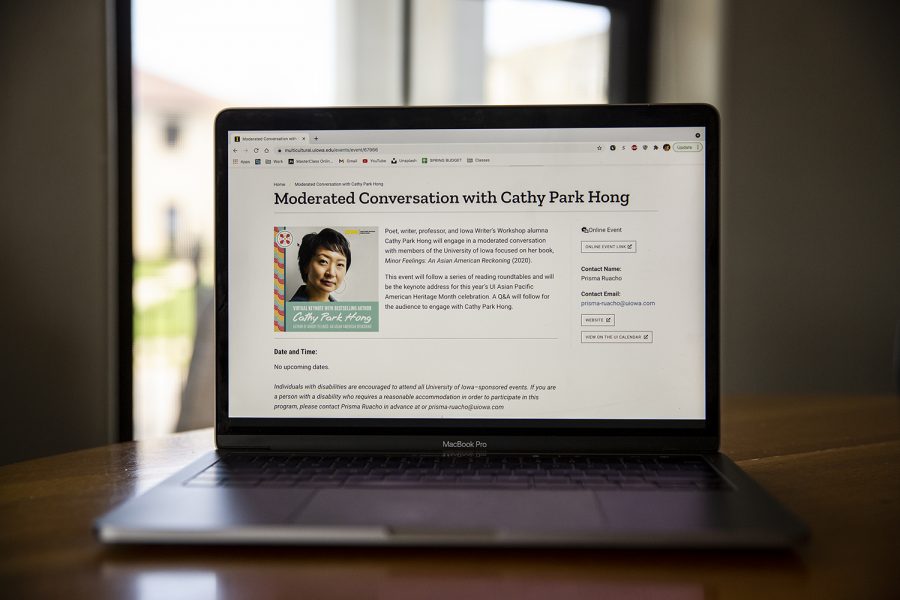Author Cathy Park Hong visits UI for keynote lecture
Hong, a University of Iowa alum, discussed her latest book, ‘Minor Feelings: An Asian American Reckoning’ with members of the University of Iowa.
The page featuring Iowa Writers Workshop Alumna Cathy Park Hong’s talk at the University of Iowa is seen on Thursday, April 22, 2021.
April 21, 2021
Cathy Park Hong was joined last night by members of the University of Iowa to engage in a moderated conversation pertaining to her most recent publication, Minor Feelings: An Asian American Reckoning. The conversation was preceded by two reading roundtables hosted by the Pan-Asian Council and UI libraries, and served as the keynote address for this year’s UI Asian Pacific American Heritage Month celebration.
Hong is a UI Writers’ Workshop alum, whose book, Minor Feelings, is a radically honest meditation on the Asian American experience. She draws upon her background as a poet and daughter of Korean immigrants to create a book of essays that fuses cultural analysis, personal anecdotes, and historical framework. In the book, Hong reflects on her feelings of shame and self loathing throughout childhood, and analyzes this in context to the stereotypes about her race fed to her by American society.
The conversation began with a question on Hong’s inspiration behind writing Minor Feelings. She gave a duel answer.
The first piece of inspiration for Hong was becoming a mother.
“If I felt a little rootless in this nation before. There was something about becoming a mother that made me feel quite rooted,” Hong said. “And by feeling even more rooted in this country, I felt more rage against this nation. And thinking about the future, or having a daughter, really had me invest in the future in the way that I didn’t before.”
Hong described the urgency she felt during Trump’s election in 2016. She knew she had to write something direct and vulnerable for people to not just understand race from an Asian American perspective, but feel it.
RELATED: Fatima Farheen Mirza reads from unfinished second novel at UI Literary Legends event
The second source of inspiration, Hong said, was to fulfill her contrarian desires of doing things that make her uncomfortable. For Hong, this meant writing a personal piece — something she had avoided because of her distaste of what she called “unspoken respectability politics,” a type of story imposed on minorities to conform to an individual triumph.
She recalled her time at the UI Writers’ Workshop in 2002, where there had been an emphasis on experimental writing — writing that didn’t buy into this trope.
“There was this expectation that — you know, it was almost uncouth to write about your Asian American experience because you were kind of buying into this commodified form of trauma that was too easy,” Hong said. “So I really felt like, when I was coming of age as a poet, I was sort of cotton blind, where whatever I was wanting to write about was too much, too angry or too dramatic, or to this or to that. For me, it was really hard to find that voice and narrative and style where I felt like I was really being honest with myself.”
Hong said she couldn’t write a personal piece without exploring what it truly meant to be Asian American.
Whether or not one is facing explicit racism, Hong said there’s an unavoidable self consciousness that Asian Ameircans feel within an all white space. She discusses a concept called, “phenomenology of whiteness,” which addresses how the racialized body doesn’t melt into the background the way white people do. She describes the tremendous amounts of stress, and sometimes shame and melancholy this can create for Asian Americans.
“You know, I sometimes wonder, ‘Is my book enough?’” Hong said.
RELATED: Opinion | Dealing with the reality of being Asian American
Hong said if she were to write the book again, she would have focused on a number of other aspects of Asian American life. The American occupation in Korea, the history of colonization across the Asian continent, the Asian body, the way Asian men are emasculated and Asian women are fetishized, and a common theme throughout the conversation: the vexing question of Black, Asian relations.
“I don’t think I dug deep enough in terms of the anti-Blackness in Asian American communities and the triangulated relationship that we’re in,” Hong said. “There are Asian Americans who are very progressive, but then there are also Asian Americans who don’t understand the long history of African Americans, the consequences of enslavement and segregation, and mass incarceration and police terrorism.”
Hong expressed the need for a coalition to be built among Black and Asian Americans. She said white supremacy continues to affect both races, and pits them against each other through negative solidarity.
Hong was then asked to give advice to attendees who identified as Asian American and Pacific Islander on how to discuss topics related to race and ethnicity in predominantly white institutions.
“Take up the space,” Hong said. “And that’s going to be probably harder, but you should definitely take up the space and be as assertive as you can and don’t shrink away, don’t shrink down. And know that even outside of Iowa City, there are millions of Asian Americans who have your back.”














